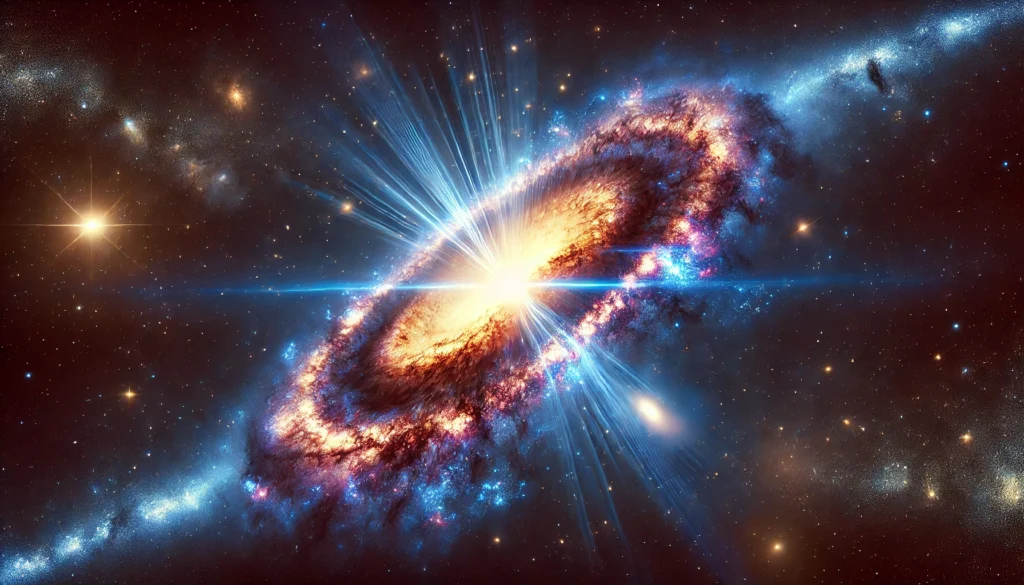Scientists have made a remarkable discovery, identifying a fast radio burst (FRB) originating from a distant galaxy billions of light-years away. The signal, named FRB 2023D, has sparked excitement and debate, with some speculating it could hint at extraterrestrial communication, while others attribute it to black holes or dying stars.
This groundbreaking detection was made by researchers from Northwestern University, who recorded 21 bursts from February to July 2023. What makes this FRB particularly significant is its origin—a “dead galaxy” that ceased star formation billions of years ago.
A Paradigm Shift in Understanding FRBs
Fast radio bursts were previously believed to come exclusively from younger, star-forming galaxies. This discovery challenges that notion, revealing that these enigmatic signals can also arise from much older, inactive galaxies.

“This is not only the first FRB linked to a dead galaxy but also the most distant from its host galaxy ever detected,” said Vishwangi Shah, a doctoral student at McGill University and co-author of the study.
Originating from a Massive, Ancient Galaxy
The galaxy hosting FRB 2023D is exceptionally bright and massive, with an estimated mass 100 billion times that of the sun. Radio astronomer Tarraneh Eftekhari noted, “This is the most massive FRB host galaxy discovered to date, among the largest galaxies known.”
Galaxies are considered “dead” when they stop producing new stars, which occurs over hundreds of millions of years as gas reserves deplete or through galactic mergers. In this case, researchers found no evidence of young stars, defying established theories of FRB origins.
“The leading theory is that FRBs are emitted by magnetars—highly magnetic neutron stars formed through core-collapse supernovae,” Eftekhari explained. “But this finding suggests a subset of FRBs could emerge from older stellar systems.”
Understanding Fast Radio Bursts
FRBs are powerful, fleeting bursts of radio waves that last only milliseconds but generate more energy in that brief moment than the sun produces in an entire year. While most FRBs are isolated events, a small percentage, including this one, repeat over time.
FRB 2023D produced over a dozen pulses, with six detected by a Canadian ground-based radio telescope. This repetitive nature makes it particularly intriguing and adds complexity to understanding its origin.
Expanding the Scope of Research
Since their discovery in 2007, thousands of FRBs have been identified, but only around 100 have been traced to specific sources. Most of these were linked to galaxies actively forming stars, making this recent detection in a dead galaxy an anomaly.
“This FRB is truly unique and challenges our existing theories about what produces these bursts,” said Shah.
The discovery raises new questions about how such energetic signals occur in regions where no new stars are being formed. Could they be linked to the remnants of older stars, or is an entirely unknown mechanism at play?
A Glimpse into the Unknown
The detection of FRB 2023D marks a significant step in unraveling the mysteries of fast radio bursts. As technology advances, astronomers hope to trace more FRBs to their origins, piecing together a clearer understanding of these cosmic phenomena.
While the idea of extraterrestrial life remains a captivating possibility, current evidence leans toward natural processes—albeit ones that are not yet fully understood.
Exploring the Depths of the Cosmos
This discovery highlights the vast mysteries of the universe, demonstrating that even galaxies long considered “dead” may harbor secrets that expand our understanding of existence.
As scientists continue to investigate FRBs, this finding serves as a reminder of the ever-evolving nature of astrophysical research and the surprises that await in the far reaches of space.



